Research Articles by Tomáš Hoření Samec
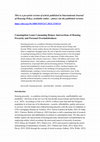
International Journal of Housing Policy, 2024
Housing precarity as a condition referring to housing insecurity and unaffordability has been on ... more Housing precarity as a condition referring to housing insecurity and unaffordability has been on the rise over the last decade across Europe and beyond. While various studies discuss the character of housing precarity and its links to (subprime) mortgage loans, the role of specific moral economies of debt in enacting housing policies which reinforce housing precarity is less developed in relation to other kinds of loans or the experience of debt enforcement. This article analyses fifty narrative interviews-thirty with debtors and twenty with institutional actors-and employs a processual methodology to highlight the performativity of personal debt and local housing policies. Performativity, enacted and modulated by moral economies of effort, (un)deservingness and (ir)responsibility, contributes to the remaking of housing precarity among indebted people, creating a vicious housing precarity-indebtedness loop. In the conclusion, we highlight the contingent and selective application of local housing policies which exclude the overindebted from municipal housing and discuss possible political and policy actions for overcoming the housing governance which generates this precarity.

New Political Economy, May 29, 2023
Personal debt is a device increasing one’s agency but embedded within moral and legal frameworks ... more Personal debt is a device increasing one’s agency but embedded within moral and legal frameworks that constructs people as individualised financial subjects. This article aims to enrich research on the state role in (subject) financialisation through a focus on personal debt governance modes as constructed in policymaker discourse on the state role in personal debt regulation. Our argument is contextualised in the Czech Republic, where, in 2021, 10 per cent of the adult population faced legal debt enforcement, significantly disrupting their economic situation. Through an analysis of 84 parliamentary debate transcripts and 32 regulatory impact assessment documents related to consumer credit and debt relief laws, we illustrate the ambivalence and complexity of debt governance and state roles. Although two main state roles were enacted—punitive and protective—the policymaker discourse forms a continuum of sorts, blending various moral logics, ascribing multiple responsibilities (individual, state and private actors) and intensively negotiating the category of debtor deservingness. We argue that by accenting financial education as a tool to solve perceived market failures (predatory lending), the financialised logic and structures are reaffirmed, albeit leaving certain discursive spaces for renegotiation and potential resistance against such state functions.
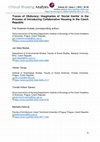
This paper explores the sociotechnical change necessary for the introduction of collaborative hou... more This paper explores the sociotechnical change necessary for the introduction of collaborative housing projects into the Czech super-homeownership housing regime. To better understand the obduracy of the current housing system, we examine the major barriers and threats to the implementation of such projects through a series of workshops with non-experts in selected cities. Our findings suggest that the housing system's obduracy is related to social imaginaries that we conceptualise as the 'imaginary of social inertia'. This form of imaginary, along with other factors such as a lack of supporting legal and financial infrastructures, creates a complex network of obstacles that reduce the likelihood of such housing projects gaining ground. In conclusion, our research emphasises the role of imaginaries in studying obduracy and thus provides valuable insights into the processes of urban sociotechnical change.

Sociologický časopis / Czech Sociological Review, 2023
In recent years, in response to the increasing unaffordability of housing, many European countrie... more In recent years, in response to the increasing unaffordability of housing, many European countries have seen a renewed interest in forms of housing that emphasise elements of cooperation, self-organisation, and shar- ing (of space, organisation, or ownership between households). In the Czech Republic, we recently identified the first efforts of some municipalities and smaller groups of citizens to transpose this ‘housing innovation’ into the Czech context, which until now has predominantly favoured individual own- er-occupied housing. Considering that these emerging forms of housing in the Czech Republic have yet to be conceptualised in theory, the goal of our ar- ticle is to initiate a debate on a more precise conceptual understanding. To this end, we propose an overarching definition of participatory housing, which we present using three defining principles and five dimensions of participation. Reflecting on existing Western European conceptualisations and a historical contextualisation of (related forms of) housing in the territory of what is today the Czech Republic, we discuss the specific dimensions of the concept of par- ticipatory housing, the conditions of its existence, and what makes it distinct from other forms of housing.
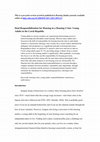
Housing Studies, 2024
Young adults in various countries are experiencing deteriorating access to homeownership and affo... more Young adults in various countries are experiencing deteriorating access to homeownership and affordable rental housing. Whereas many studies have focused on the shift of responsibility for housing from the state to individuals related to a meritocratic ideology, only recently have certain studies identified the ambiguity and incoherence as a significant principle in housing discourses. Responding to these, we analysed 31 narrative interviews and survey data on Czech young adults (aged 18-35), providing unique evidence from a country where access to the housing market is significantly, albeit gradually, worsening. Our focus is on who they ascribe responsibility for housing provision, demonstrating how their strong calls for state intervention intermingle with a belief that individual solutions to the housing crisis are still possible. We illustrate how this ambivalent dual responsibilization is overcome through a complex interplay between moralities, rationalities and, importantly, through reference to emotions and the practices of intergenerational transfers which normalize the attachment to existing housing practices, ideologies and responsibilities.
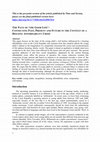
Time and Society, 2021
This article focuses on the topic of the young adult’s cleft habitus influenced by a housing affo... more This article focuses on the topic of the young adult’s cleft habitus influenced by a housing affordability crisis in the Czech Republic and examines how this situation affects the young adult’s relation to the imagination of a temporally structured life course and synchronization of life spheres (housing, family, and work). This article is based on qualitative in-depth interviews conducted in the four cities most affected by the house and rent price increase. The general question addresses if and how social inequalities, sharpened by the current housing affordability crisis, affect the process of narrative life course coherence creation (the connection of past, present, and future) in relation to an orientation toward a vision of “the good life.” We furthermore complement the already existing ideal types of the young adult’s relation toward time— confident continuity and cautious contingency (Nielsen A (2019a) Levels of intersecting temporalities in young men’s orientation to the future. A cross-national case comparison. Time & Society 0(0): 1–22)—with two other two types— cautious continuity and total contingency—defined on the basis of our data. We argue that the ability of young adults to envision a coherent future is related to the feeling of secured housing and that the idea of the good life is depicted to a large extent through the ideal of homeownership, although the precarity of the housing market makes homeownership harder to reach for those from unprivileged backgrounds.

Studia Ethnologica Pragensia, 2020
Self-help housing has been proposed as a solution to provide qualitatively adequate and affordabl... more Self-help housing has been proposed as a solution to provide qualitatively adequate and affordable housing not only nowadays, but also during the late state socialism in the 1970s and 1980s in the former Czechoslovakia. In this article, we focus on how the self-help housing provision was during that era linked with the responsibilisation of households, a technique of governance usually associated with neoliberal regimes. On the case of self-help housing construction in town Myjava, which was supported by local authorities and initiated by local company eager to attract workers, we show then eventually main burden for management and risks steaming from the construction was carried by the individuals and their (extended) families. Seemingly the ideological contradiction of this indi-vidualistic solution was resolved through rigorous standardization of construction projects, which enabled to maintain a self-help housing as one of the regime's tools for solving the housing question. We argue that in this respect, in the shift of responsibility from the formal institutions to the individuals, the housing system displays continuity between the late socialist and capitalist regimes, thus contributing to emerging body of literature which problematise the strict dichotomy between the socialist and capitalist eras.
Competition & Change, 2019
This article explores how financialized subjectivities have been performed in household economy m... more This article explores how financialized subjectivities have been performed in household economy manuals under two successive socioeconomic regimes in the former Czechoslovakia and the current Czech Republic: state socialism and neoliberal capitalism. Drawing on a layered performativity framework, we studied how rhetoric, devices and instructions used in manuals construct households into self-reliant actors who embrace financial products. We found that subjects were already being financialized by the manuals of the socialist era, particularly those from the 1980s. The main change concerned the treatment of temporality and the occurrence of calculative devices. Our findings challenge the idea that financialization has emerged under the regime of neoliberal capitalism and implies that financialization is part of a longer trend in modern economic governance.
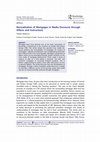
Housing, Theory and Society, Jan 3, 2019
Mortgage loans have become one of the main instruments of becoming a homeowner in the countries o... more Mortgage loans have become one of the main instruments of becoming a homeowner in the countries of Central and Eastern Europe (CEE). This article brings into question how media dis- course performs the normalization of mortgages. An analysis of newspapers, websites and television news broadcasting transcripts from 1996 to 2016 in the Czech Republic identified a production of affects which can be articulated through specific emotions as the main mode of mortgage performance. These create a sense of urgency to take on a loan before it becomes “too late” and construct mortgages as successful financial products. This is further supplemented by articles which offer instructions on how to become debtors. The article discusses how the normalization of mortgages, through a rather monolithic media discourse, is unable to articulate a different version of the housing system that would rely less on homeownership achieved through mortgages.
Limited free e-copies here: https://www.tandfonline.com/eprint/kH9hkERguk2I9yJPCnVk/full?target=10.1080/14036096.2019.1584584
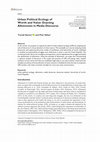
Space and Culture
In this article, we propose to expand the field of urban political ecology (UPE) by analyzing the... more In this article, we propose to expand the field of urban political ecology (UPE) by analyzing the role of discourse in the production of urban nature. We exemplify our case by analyzing media discourses and exploring discursive modes of justification and hierarchies of worth mobilized in socialist and postsocialist struggles over allotments in what is now the Czech Republic. We unravel particular discursive strategies and arguments used to depoliticize the struggle and justify the abolishment of allotments. Using the example of allotments, we argue that incorporating a rigorous analysis of discourse in the scope and practice of UPE and paying close, explicit attention to how worth and value are mobilized might help us not only to better understand the complex processes of the production of socio-natures in (neoliberal) cities but also to empower UPE scholars with tools to further the fight for more just urban environments.
Free e-copies available: http://journals.sagepub.com/eprint/JfGx94Qv76PS8IyDqak5/full
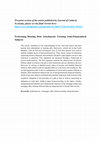
Journal of Cultural Economy, Jul 30, 2018
This article contributes to the understanding of how first-time buyers and their parents form att... more This article contributes to the understanding of how first-time buyers and their parents form attachments to housing debt. Interviews, carried out in the Czech Republic, with 40 first-time homebuyers and 10 with their parents were used to identify multiple layers of debt performativity. These layers consist of statements expressing moral evaluations and emotions; calculative and cognitive devices; and references to practices. Two arguments are advanced through a framework of layered performativity. The first argument concerns the subjectivities of debtors. Debtors adopt investment concepts in their statements and use calculative devices. However, by relying on familial moral orders of security and familial financial transfers, these debtors must be regarded rather as semi-financialised subjects. The second argument relates to the re-configuration of social and economic relations in families. Debt attachment endorses the use of intergenerational financial transfers, which in turn may enforce continued intra-familial reciprocity, both in terms of the recipients’ obligation to the providers of a gift or loan as well as concerning an obligation to help their children attain homeownership in the future. Finally, intergenerational transfers also transform the character of the mortgage market and mortgage debt, making informal debts an important part of formal debt circuits.
Limited free download of the article available here: https://www.tandfonline.com/eprint/pyHTnKttSn3UAupc73vD/full

Czech Sociological Review, 2017
The article examines how notions of thrift, saving, and frugality were present and active in the ... more The article examines how notions of thrift, saving, and frugality were present and active in the state-socialist discourses of economic behaviour and what meaning these notions carried. The research is based on three kinds of data: the official state-socialist public discourse of economic behaviour as presented in transcripts of parliamentary speeches, household guides and manuals, and eyewitness accounts of the state-socialist era recollected in oral history interviews. Such a multi-faceted corpus of discourse data made it possible to examine factual and normative aspects of thrift in state-socialist discourses and compare them with the accounts of everyday practices and tactics that may well contradict the official discourse. The analysis reveals that (a) notions of thrift and saving were strongly present throughout the period in all discourses examined, (b) both terms underwent a semantic shift from a productive to a restrictive meaning over time, and (c) both notions were eventually publicly sidelined by the emphasis on raising revenue. Despite fading from public discourse in the late 1980s, the notion of thrift had by then become instilled in the subjective understanding of the 'reasonable consumer', a concept that can therefore be considered a precursor of the contemporary concept of consumer responsibilisation.
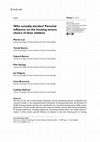
Urban Studies, 2018
We focus on the role of within-family socialisation and the relationship between socialisation an... more We focus on the role of within-family socialisation and the relationship between socialisation and resource transfers in the intergenerational transmission of housing preferences, the formation of familial housing attitudes and thus the reproduction of a normative housing tenure ladder across generations in Czech society. We show that resource transfers and the within-family socialisation of housing preferences, including preferences concerning housing tenure, are closely interconnected. In other words, parental influence on decision to buy own housing (and on housing preferences in general) of their adult children through socialisation is stronger if there is an (actual or assumed) intergenerational resource transfer. This has several implications for how housing markets and systems work. The paper draws on findings from qualitative, quantitative and experimental studies.
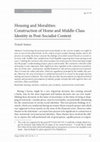
Constructing the personal and social identity in the current complex era might be seen as non-tri... more Constructing the personal and social identity in the current complex era might be seen as non-trivial achievement. In the context of post-socialist housing market and in the practice of creating the home I present the findings of my field research based on several interviews with " middle-class " people from Czech Republic acquiring their home during recent years. Combing the narrative and content analysis the article presents broad and deep insight into the people᾽s understanding of space, places and morality. The conclusion is that the realm of housing is more important, than might have been regarded in the connection of performance of certain roles – good parent, capable husband or wife and successful person in general. Thus it reveals the values and ethos, which are regarded as principal by the middle-class people. Moreover the issue of emotions is tackled and proved to be crucial in the people decision making and moral evaluation. The article thus provides the presentation of original method of analysis and persuasive presentation of ordinary people everyday life with regard to their valued ethos, objects and beliefs.
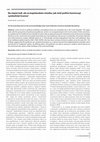
Levels of trust in political institutions and political actors are constantly low in the Czech Re... more Levels of trust in political institutions and political actors are constantly low in the Czech Republic. This paper deals with the perspective of professional politicians, which is an unexplored topic in the Czech context. At the same time, we supplement the traditional view of political culture with an approach based on interpretive and constructivist sociology. We focus on the construction of symbolic boundaries by Czech politicians. We pursue a combination of narrative (Ricoeur) and critical discourse analysis (Wodak) based on 21 thematically oriented biographical interviews with politicians from three traditional political parties (ODS, ČSSD, KSČM) who have been actively involved in politics since the early 90’s. The ndings suggest that the politicians use symbolic boundaries as a cultural instrument for legitimizing their identity, status and practice of “traditional” politics. By de ning others, the politicians are able to construct a reality in which they are on the same boat with citizens while standing on the command bridge.
The manner in which mass loyalty in socialist and other post-totalitarian societies is maintained... more The manner in which mass loyalty in socialist and other post-totalitarian societies is maintained is still a matter of discussion. To contribute to the debate this article studies strategies of discontent in late Czech socialism as described in sixty oral history narratives of three groups of narrators (communist functionaries, dissidents, and ordinary people). Drawing on a modified version of Hirsch’s exit–voice–loyalty model, the study reveals an important characteristic of the expression of discontent in this post-totalitarian society - the strategic distinction between political and non-political behaviour. Labelling discontent as either a political or non-political matter was a key trait of power plays.
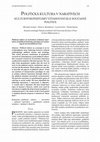
Political culture as a concept is an interdisciplinary issue balancing between cultural anthropol... more Political culture as a concept is an interdisciplinary issue balancing between cultural anthropology, political science and sociology. This article presents conclusions of qualitative research of contemporary czech political culture. Our research is based on 35 narrative interviews conducted by students with their parents. We can infer from quantitative studies that the level of trust in the political system, institutions and actors has hit the bottom. These studies are not able to describe all aspects of political culture. From our position of interpretative paradigm we aim to analyse cultural repertoires through which is the political situation narratively reconstructed. We perceive narrative as a performative genre of refering to social reality. We have identified the following repertoires: 1. interested, 2. objective,3. evasive and 4. alienated. We have found four types of layman’s theories, which were used by narrators to explain the drop of trust in politics: 1.communist past 2. the nature of the Czech nation 3. fatalistic theories of power 4. theories of “these days”.
Books by Tomáš Hoření Samec
Munipress, 2023
Participativní bydlení znamená, že na přípravě projektu bydlení nebo jeho části, na investici, př... more Participativní bydlení znamená, že na přípravě projektu bydlení nebo jeho části, na investici, případně na správě bydlení spolupracují obyvatelé. Cílem metodiky je představit možnosti, jak mohou obce podporovat a rozvíjet participativní bydlení a diskutovat limity, které s tímto přístupem souvisí.

Sociologický ústav AV ČR, v. v. i., 2022
Jednou z řady krizí, které v současnosti čelí – nejen česká – společnost, je i krize bydlení. Cen... more Jednou z řady krizí, které v současnosti čelí – nejen česká – společnost, je i krize bydlení. Ceny bytů a domů, ale i nájmů raketově rostou a bydlení se stává stále hůře dostupným. Možnost pořídit či zajistit si bydlení se přidává k řadě dalších omezení, jež se propisují do již existujících společenských nerovností a dále je prohlubují. Zároveň se nedostupnost bydlení stává palčivým problémem zejména, i když nikoli výhradně pro mladé lidi, kteří se ocitají v životní situaci, kdy chtějí či potřebují bydlet – sami či v rámci zakládané rodiny.
Jak na tuto skupinu tzv. mladých dospělých dopadá krize bydlení? Jak se k bydlení staví, jak si jej představují a plánují? A jak do představ a plánů promlouvá právě rostoucí nedostupnost bydlení? Jak tato nedostupnost ovlivňuje představy o tom, kdo je a kdo má být za zajištění bydlení zodpovědný? A jak jsme se do situace krize bydlení vůbec dostali a jak na ni reagujeme, ať již jako společnost, nebo jako jednotlivci?
Na tyto a podobné otázky odpovídá kniha určená nejen odborné, ale hlavně širší poučené veřejnosti. Představuje výsledky několikaletého sociologického výzkumu přístupným jazykem tak, aby byla zajímavá jak pro odborníky, tak pro zainteresovanou veřejnost, jako je novinářská obec, studující (na vysokých školách), politická reprezentace a státní správa či samospráva, ale také všichni ti, kteří mají zájem porozumět současné situaci krize bydlení a tomu, jak dopadá (nejen) na mladé lidi.
Kdo šetří, má za tři? Diskurz šetrnosti v proměnách české společnosti. Praha: Sociologické nakladatelství., 2019
Otázka, zda a jak šetřit, je trvalou součástí rodinných i veřejných diskuzí a budí někdy až vášni... more Otázka, zda a jak šetřit, je trvalou součástí rodinných i veřejných diskuzí a budí někdy až vášnivé emoce. V základech těchto diskuzí je podle autorů knihy nejen mnohoznačnost, ale především morální rozměr pojmu šetrnost a dalších ekonomických pojmů. Autoři ukazují, že lidé o významy a hodnocení ekonomických pojmů svádějí boje, v nichž jde o moc, identitu a nezřídka i o společenskou důstojnost. V obecné rovině autoři upozorňují na významnou roli, jakou v ekonomice hraje jazyk a komunikace.
Kniha je určena výzkumníkům, učitelům, studentům a dalším čtenářům, kteří se zajímají o roli diskurzu v utváření (nejen) ekonomického jednání jedinců, sociálních skupin a institucí.










Uploads
Research Articles by Tomáš Hoření Samec
Limited free e-copies here: https://www.tandfonline.com/eprint/kH9hkERguk2I9yJPCnVk/full?target=10.1080/14036096.2019.1584584
Free e-copies available: http://journals.sagepub.com/eprint/JfGx94Qv76PS8IyDqak5/full
Limited free download of the article available here: https://www.tandfonline.com/eprint/pyHTnKttSn3UAupc73vD/full
Books by Tomáš Hoření Samec
Jak na tuto skupinu tzv. mladých dospělých dopadá krize bydlení? Jak se k bydlení staví, jak si jej představují a plánují? A jak do představ a plánů promlouvá právě rostoucí nedostupnost bydlení? Jak tato nedostupnost ovlivňuje představy o tom, kdo je a kdo má být za zajištění bydlení zodpovědný? A jak jsme se do situace krize bydlení vůbec dostali a jak na ni reagujeme, ať již jako společnost, nebo jako jednotlivci?
Na tyto a podobné otázky odpovídá kniha určená nejen odborné, ale hlavně širší poučené veřejnosti. Představuje výsledky několikaletého sociologického výzkumu přístupným jazykem tak, aby byla zajímavá jak pro odborníky, tak pro zainteresovanou veřejnost, jako je novinářská obec, studující (na vysokých školách), politická reprezentace a státní správa či samospráva, ale také všichni ti, kteří mají zájem porozumět současné situaci krize bydlení a tomu, jak dopadá (nejen) na mladé lidi.
Kniha je určena výzkumníkům, učitelům, studentům a dalším čtenářům, kteří se zajímají o roli diskurzu v utváření (nejen) ekonomického jednání jedinců, sociálních skupin a institucí.
Limited free e-copies here: https://www.tandfonline.com/eprint/kH9hkERguk2I9yJPCnVk/full?target=10.1080/14036096.2019.1584584
Free e-copies available: http://journals.sagepub.com/eprint/JfGx94Qv76PS8IyDqak5/full
Limited free download of the article available here: https://www.tandfonline.com/eprint/pyHTnKttSn3UAupc73vD/full
Jak na tuto skupinu tzv. mladých dospělých dopadá krize bydlení? Jak se k bydlení staví, jak si jej představují a plánují? A jak do představ a plánů promlouvá právě rostoucí nedostupnost bydlení? Jak tato nedostupnost ovlivňuje představy o tom, kdo je a kdo má být za zajištění bydlení zodpovědný? A jak jsme se do situace krize bydlení vůbec dostali a jak na ni reagujeme, ať již jako společnost, nebo jako jednotlivci?
Na tyto a podobné otázky odpovídá kniha určená nejen odborné, ale hlavně širší poučené veřejnosti. Představuje výsledky několikaletého sociologického výzkumu přístupným jazykem tak, aby byla zajímavá jak pro odborníky, tak pro zainteresovanou veřejnost, jako je novinářská obec, studující (na vysokých školách), politická reprezentace a státní správa či samospráva, ale také všichni ti, kteří mají zájem porozumět současné situaci krize bydlení a tomu, jak dopadá (nejen) na mladé lidi.
Kniha je určena výzkumníkům, učitelům, studentům a dalším čtenářům, kteří se zajímají o roli diskurzu v utváření (nejen) ekonomického jednání jedinců, sociálních skupin a institucí.
Nicméně pokládat pražská sídliště za místa, kde se zastavil čas a ustaly všechny změny, by byla iluze. Dotýkají se jich totiž procesy, které souvisí s rostoucí tendencí ke komodifikaci bydlení a městského prostoru, dochází na nich ke generační obměně, k plánování revitalizace budov a veřejných prostranství, někdy souvisejících se zástavbou volných ploch, či přistěhování nových obyvatel, které přináší etnickou diverzitu. Proměňuje se také finanční dostupnost bydlení na pražských sídlištích, kdy rostoucí ceny nemovitostí a potažmo rostoucí nájemné sídliště postupně vzdalují od ideálu místa, kde mohou bydlet různé sociální vrstvy, nejen ti bohatí.
Tato publikace je koncipována, aby byla čtenářsky přístupná a nebyla čistě akademickým a teoretickým textem, který osloví jen úzký okruh odbornic a odborníků. Kolektiv autorek a autorů proto zahrnuje jak sociální vědce a vědkyně, historičku umění a architektury, ale také novinářky a jednotlivé kapitoly jsou i proto mozaikou různých žánrů, zahrnující teoretičtěji zaměřenou kapitolu, kapitoly vysvětlující i kapitoly popisující některé z procesů a proměn, kterým sídliště čelí, ale třeba i fotografickou esej.
Editují: Tomáš Hoření Samec, Terezie Lokšová
Otázka snižující se dostupnosti bydlení konceptualizovaná pomocí pojmu krize bydlení rezonuje v globálním i středo-a východoevropském akademickém i politickém diskurzu. V českém prostředí se pojem krize bydlení ustavuje i v reakci na dynamickou proměnu českého trhu bydlení a prudký růst cen nemovitostí i nájemného. Navrhované tematické číslo má ambici kriticky reagovat na daný vývoj a poskytnout prostor pro rukopisy, které budou různými koncepty a v různých kontextech kriticky reflektovat krizi dostupnosti bydlení a případně také diskutovat možnosti jejího řešení.
Z editorského hlediska uvítáme především rukopisy, které budou mít potenciál pro inovativní diskusi otevíráním nových perspektiv a témat, jež souvisejí s nedostupností bydlení, jako jsou například otázky kvality bydlení a života, role státu a samospráv, formy participace různých aktérů na řešení krize, role diskurzu při formování specifického systému bydlení a podobně. V tomto smyslu je ambicí tematického čísla přispět k rozvoji široce zaměřených studií bydlení v českém kontextu.
Tematické číslo bude otevřené příspěvkům v podobě teoretických, diskusních, komparativních a empirických statí nebo případových studií, které by měly být zaměřené například, ale ne výlučně na otázky: diskurzivní konstrukce krize dostupnosti bydlení a jejího řešení; environmentálních souvislostí krize bydlení a jejího řešení; inovativních nebo neformálních praktik a taktik jako reakcí obyvatel na nedostupnost bydlení (například participativní formy bydlení, sociální a komunitní vztahy a interakce v rámci různých forem bydlení); role státu a veřejných institucí při řešení nedostupnosti bydlení; souvislostí mezi kvalitou bydlení a kvalitou života (obecně i specificky pro různé skupiny, struktury a prostory); teoretické debaty relevantních konceptů a rámců; územního rozvoje a městské správy jako pole, kde je dostupnost bydlení vyjednávána.
Abstrakt o rozsahu 250-500 slov by měl obsahovat jméno autora/autorky nebo autorů, název pracoviště, kontaktní údaje, název příspěvku, zaměření příspěvku, výzkumný problém/otázky, metodu výzkumu a předběžné (nebo očekávané) závěry.
Abstrakty lze zasílat do 31. 5. 2021 na emailovou adresu: casopis@soc.cas.cz a na adresu editorky terezie.loksova@soc.cas.cz a editora tomas.horeni-samec@soc.cas.cz. Rozhodnutí o přijetí nebo nepřijetí abstraktu budou rozeslána do 30. 6. 2021. Statě připravené k recenznímu řízení budeme očekávat do 17. 12. 2021. Texty budou procházet standardním recenzním řízením a jejich publikace závisí na výsledcích tohoto řízení. Uvítáme také texty dalších forem a žánrů: odborné recenze knih, eseje, zprávy nebo rozhovory na výše zmíněná témata.
Editorkou a editorem čísla jsou: Mgr. Terezie Lokšová (Sociologický ústav AV ČR) a Mgr. Tomáš Hoření Samec, Ph.D., (Sociologický ústav AV ČR).
-Quantitative research examining how demographic events such as leaving the parental home, childbirth, employment transitions or changes in partnerships are linked to housing and neighbourhood transitions.
-Studies of family relations and housing pathways-including work exploring intergenerational social mobility within housing systems, practices of family support in housing markets, and the socialisation of housing aspirations/preferences.
-Research into international and internal migration flows, in particular the ways these reshape and are affected by housing systems and family networks.
-Analyses of how family life is affected by housing conditions, design and systems of housing welfare and support.
-Theoretical and applied research drawing on constructionist perspectives, discourse analysis and/or innovative participatory research methods to understand family practices, (im)mobility behaviours and relational interactions within housing systems. If you are interested in presenting, please email Isabel Palomares Linares (m.i.palomares@rug.nl), with the following:
-Title of the research to be presented
-Author/s names, affiliations and contact information
-A short abstract of up to 200 words
The deadline for abstract submissions is 20 th November 2020. A more precise schedule, along with information about session formats and the web platform to be used, will be e-mailed to all participants once we know the final numbers involved. We hope to see you next January!